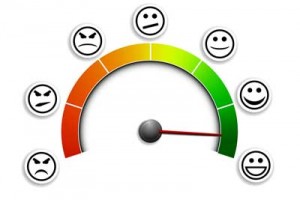

“Sustained Arousal”
Wyller’s “sustained arousal” hypothesis proposes that a persistent stress response is causing many of the symptoms found in Chronic Fatigue Syndrome. In particular, Wyller believes this persistent stress response is mucking up autonomic nervous system functioning in the disorder.
We have suggested that the autonomic alterations, as well as other features of CFS, might be attributed to a persistent stress response or “sustained arousal”

Wyller believes negative expectations and thoughts are resetting autonomic nervous system functioning in “CFS”
That sentence is a little hard to understand given that the autonomic nervous system is part of the stress response (“a persistent stress response causes a persistent stress response?”). Wyller’s grasp of the “stress response”, however, appears to equate more to a barrage of stressful thoughts and ideas than to physiological problems.
“Of note, this model predicts that expectancies modulate autonomic nervous activity… We hypothesized that expectancies might be an important determinant of the autonomic responses in CFS.”
Few would disagree with the idea that “expectancies” or negative expectations would affect ANS activity. The sympathetic nervous system or fight or flight system, after all, is designed to help us deal with stressful situations of which negative expectations are one.
While others are looking for physiological reasons to explain the ANS dysfunctions, Wyller appears to believe that negative thoughts (“expectancies”) are the primary movers of autonomic nervous system dysfunction in ME/CFS.
For Wyller, ME/CFS appears to be a kind of internal PTSD where the mind so over-reacts to symptoms produced in the body that it actually changes the physiology of the body.
He tested that idea in this study.
The Study
Wyller measured autonomic variables such as heart rate, blood pressure, stroke volume, and heart rate variability while people with Chronic Fatigue Syndrome were lying down, while they imagined themselves standing up, and while they underwent a 20 degree tilt table test. According to Wyller his CFS group should demonstrate more ANS dysregulation as their negative expectations increased during the mental imaging period and then during the tilt test.
Findings
It didn’t work out that way.
Wyller found significantly altered autonomic nervous system findings in his ‘CFS’ group when they were lying down at baseline in a rested position. That was to be expected. Increased heart rates and decreased heart rate variability found during rest has been documented in ME/CFS before.
During the imagining standing session SNS function did become altered (subtly altered) in Wyller’s CFS group, but where the rubber meets the road – in the tilt table test – it did not. According to Wyller’s hypothesis, the negative expectations his ‘CFS’ group harbored regarding the tilt table test should have dysregulated their autonomic nervous systems when they actually got on the tilt table.
That didn’t happen. In fact, contrary to Wyller’s hypothesis the more stress his group was put under the better their autonomic nervous systems appeared to perform relative to his controls. Compare the seven measures of ANS functioning that were “off” during the baseline rest period to the four that were “off” during the mental imagining test, to the zero measures that were “off” during the tilt table test.
Not only were more measures of ANS functioning ‘off’ in Wyller’s ‘CFS’ group during the baseline rest period than the stressful mental imaging task, but the degree that they were off – the significance levels – was much greater as well (avg. significance baseline rest period vs mental imaging – p<.015 vs p< .038).
In fact, in this study the more stress that was present the more the CFS patients looked like healthy controls – just the opposite of what Wyller’s hypothesis predicts.
That didn’t keep Wyller from arguing that ‘expectancies’ or negative expectations were still driving the ANS dysregulation seen in his ‘CFS group’ during the baseline period (presumably because they were worried about taking a tilt table test.)
“Taken together, these results are congruent with different expectancies among CFS patients.”
That assertion belies the fact that studies have demonstrated ANS alterations both at rest and during sleep in studies in which tilt table tests were not imminent.
Wyller’s last study found that, contrary to his hypothesis of sustained arousal, Clonidine – a sympathetic nervous system suppressor – made his patients worse, not better. In this study his hypothesis struck out again.
Subtle Findings Need Not Apply
“In both groups, the changes from baseline are rather subtle.”
Wyller noted that his findings were rather subtle and then proposed more studies examining how negative expectations were driving physiology in ME/CFS. Whatever Chronic Fatigue Syndrome is, however, it is not a “subtle” disorder. Dr. Bateman recently noted that ME/CFS is the main cause of illness-related school absence in the U.S. She also noted how difficult it is to get adolescents to miss considerable amounts of school time. ME/CFS is a profoundly disabling disorder that produces, in some cases, fatigue so extreme as to almost defy belief. Subtle findings are not an answer.
Backlash Imminent
Wyller’s overt emphasis on the mind in ME/CFS runs the risk of what Wessely’s similar emphasis did: producing a backlash that throws the baby out with the bath water.
It’s surely true that anticipation and the accompanying sympathetic nervous system activation it causes cannot be helpful in ME/CFS. Try imaging a situation in a stressful light, and then put it in a less stressful context and observe how your body reacts. Reducing negative anticipation and other forms of mental and emotional stress in a disorder in which both axes of stress response (ANS, HPA axis) are active is a good idea – there’s just no indication that it’s the answer for the vast majority of ME/CFS patients.
With that in mind, I propose a new guideline for assessing the effectiveness of potential research studies called the Toni Bernhard Rule.
The Toni Bernhard Rule

Toni Bernhard has written a book on using mind/body techniques to improve wellness in ME/CFS and other disorders. Her health remains severely impaired.
Toni Bernhard is a former law school professor and experienced meditator with a severe form of ME/CFS. She has written several books and many blogs on ways to improve one’s well-being using mind/body techniques. Despite years of this practice, however, she remains physically quite disabled. If anyone understands the effects of the mind on the body, it’s Toni Bernhard.
The Toni Bernhard rule suggests that if a proposed study could help explain why Toni is ill it should be given top priority. If it can’t, funders might want to think again. This is not to say that stress reduction is not valuable – it is, but if you’re committed to getting at the core of this illness, asking yourself whether a proposed study might help explain Toni Bernhard’s illness might be a good start.
Is Wyller Studying Chronic Fatigue Syndrome?
The normalization of autonomic nervous system that occurred in the CFS group during tilt table testing in this study runs contrary to Wyller’s past studies, and that brings up another question – just who is Wyller studying?
Wyller has chosen throughout his work to use his own definition of chronic fatigue syndrome. The Wyller definition of ME/CFS (“three months of unexplained, disabling, chronic/relapsing fatigue of new onset”) requires no symptoms beyond fatigue. This study, which found that thirty-one percent of his ‘chronic fatigue syndrome’ group couldn’t even meet the mild Fukuda criteria for CFS, suggests that he’s often not studying Chronic Fatigue Syndrome as it’s been defined and researched.
Most researchers use Fukuda as a matter of course. For years, the largest medical research funder in the world, the National Institutes of Health (NIH) in the U.S., required ME/CFS researchers to use Fukuda to ensure at least some degree of homogeneity prevailed in research studies. (Now, recognizing the need to assess the effectiveness of other definitions, it’s become open to other definitions being used. In contrast to Wyller’s definition, however, these definitions were developed by consensus groups.)

Wyller is not studying the same type of ‘CFS’ patient that the vast majority of ME/CFS researchers are.
By not using the standard research definition of ME/CFS Wyller’s put a question mark on the significance of every study he’s published. Given that almost a third of the participants in his latest study couldn’t meet the Fukuda definition, it’s a pretty big question mark that makes it impossible to compare his findings to others in the field. Why Wyller is willing to sacrifice a degree of validation or even pertinence in the ME/CFS research field in order to have his way in this area is unclear.
Given the consensus in the field that’s formed around an even more stringent definition of ME/CFS – the Canadian Consensus Definition – the participants in his studies are probably a poor match for what most in the field consider to constitute Chronic Fatigue Syndrome.
Conclusion
Wyller’s “sustained arousal” model of ME/CFS appears to be largely built on the idea that false perceptions and negative expectations alter autonomic nervous functioning which in turn causes many symptoms. In this study he hypothesized that the perception that standing is going to be harmful would raise sympathetic nervous system activity in his ‘CFS group’ during tilt table testing. Contrary to his ‘sustained arousal’ hypothesis, however, autonomic nervous system functioning was at its worst in his CFS group during the baseline rest period and improved as stress and negative expectancies increased.
The large of number of study participants who did not meet the Fukuda criteria suggest Wyller is not studying the same kind of “CFS” patients as the rest of the ME/CFS research field, making it impossible to know how (or even if) his findings relate to the rest of the field.








I’m ashamed to be Norwegian… Full stop.
Actually I am very happy with Norway in general. Norway is the first country where the government apologized to ME patients for how we are treated. Its the home of the big phase 3 Rituximab trial. It went from “what has Norway got to do with ME” to “all eyes on Norway”. That is not to say there are not issues … the whole world is facing psychiatry run amok.
Criticism was vast ethically as to the fact that the trial consisted of children aged 12 – 18 years of age.
What a waste of research funding !
Well, one result Wyller found seems to be true, because when I read this I get so angry that it stimulates my ANS and I feel a little better.
Back to “neurasthenia”, female “hysteria” and fainting couches. (Fainting couches probably had more to do with the tight whalebone corsets ladies had to wear. They couldn’t draw a deep breath or eat any more “than a bird”.)
Teenagers get a lot of post viral fatigue, including mono. Ninety percent of those cases do not resemble ME aside from chronic fatigue. So at least ninety percent of cases, and probably more, are irrelevant to ME. This is a chronic fatigue ANS study. Even Fukuda wanted subgroups, and thought in time the science would move that way. As science focuses more and more on specific types of disease, the biopsychosocial crowed are more and more are trying to lump diverse diseases together.
Good point Alex. It is interesting that the groups that do focus more on behavioral treatments tend to use vaguer,more inclusive definitions…Interesting.
I found it interesting that his patients worsened on clonidine. The same thing happened to me and I assumed that I was a CFS anomaly.
I guess not! It was quite an unexpected result. Not only did they not get better -but they actually got worse. I imagine that result turned a few heads.
I believe that today’s ME/CFS is actually yesterday’s neurasthenia, but that doesn’t mean I believe ME/CFS is a psychological illness. George Miller Beard, a neurologist believed neurasthenia was a physical illness common in brain-working house holds of the United States, but not common in the muscle-working households.
George Miller Beard defined neurasthenia in 1869 as a medical condition with the symptoms of excessive physical and mental fatigue, muscle weakness, anxiety, headache, malaise, neuralgia and depression; the result of the central nervous system’s nerves becoming exhausted. Dr. Beard believed this to be a result of societal stresses and that certain people were more prone to develop neurasthenia He felt it was more common among those with a more refined nervous system, including intellectuals and professionals.
Neurologists, not psychiatrists,continued to see the disorder well into the 20th century. Neurasthenia did not disappear, but was later reclassified into psychological diagnoses. Sound familiar?
*******************
The book (linked below) from 1894 “A Practical Treatise of Nervous Exhaustion” describes how a certain type of person was more likely to develop ME/CFS. The treatment was rest, not exercise. I believe that persons with chronic fatigue who improve with exercise, do not have the neurological illness ME/CFS.
“The doctrine to be taught and strongly enforced is that many of these patients are not neurasthenic, and under hardly any conceivable circumstance could they become neurasthenic. They do not belong to the type out of which neurasthenia is born, either mentally or physically.
Many of them are unintellectual, phlegmatic, and intolerably indolent, and are pleased at a diagnosis which touches the nerves rather than the stomach, bowels, and liver. Instead, therefore of rest and soothing draughts, they need mental and physical activity, less rather than more food, depletion rather than repletion.”
No matter what you believe about ME/CFS, this is an interesting read that demonstrates the similarities between neurasthenia and ME/CFS:
https://archive.org/stream/apracticaltreat03beargoog#page/n9/mode/2up
I’m with Toni!
“Dr. Bateman recently noted and that ME/CFS is the main cause of illness related school absence in the U.S. ”
Where is the research data to support that?
I don’t know. Dr. Bateman stated that in a presentation she made earlier this year I believe.
Wyller’s hypothesis….incorrect from the get-go. What a waste so I’m not going to waste by critiquing any further. Except to say that I LIKE ME so put that on your bumper sticker!!! .
Wyller may be wrong about the cause of sustained sympathetic arousal but I do think his study has some value in that it shows that his group had a better response than the controls during the tilt- table test, proving that the SNS is over-reacting in order to achieve the same outcome as the controls. I call it spiking. With every action, there is an equal and opposite reaction so no wonder it under reacts when the group is lying down. This is a failure of the control processes that manage homeostasis, mostly by the hypothalamus. The hypothalamus is obviously having trouble measuring the amount of cortisol needed for each situation and hence is unable to regulate the amount. An analogy would be turning on a tap to fill a cup and being unable to time correctly when to turn the tap off so the cup doesn’t overfill and then turning off the tap too tightly (the same reason being that it can’t measure how much force needed to turn the tap off.) The fact that the study was with adolescents adds to my hypothesis that these illnesses are not static and change over time. Initially, the SNS has to work harder to achieve the same outcome but over time can no longer sustain this and starts to fail. This shows a similarity to the fact that it has been documented that the younger patients have increased grey matter in certain areas of the brain whereas the grey matter is much reduced in older patients.
Interesting. Thanks for that. Several people have told me that it’s necessarily that the SNS is over-reacting but the ANS doesn’t really know what it do and it’s shifting all over the place in order to find homeostasis.
”Wyller appears to believe that negative thoughts (“expectancies) are the primary movers of autonomic nervous system dysfunction in ME/CFS.”
This explanation is really to simple. I believe in ANS dysfunction but the cause is pure Physical.
I get tired of people like Wyller.
Is it me or did every paragraph say the same thing?
I hope there wasn’t a lot of funding invested in this study. Once again I walk away knowing that any of us with a long history of CFS could have shared something more substantial.
It was you. There may have some overlaps but EVERY paragraph certainly did not say the same thing.
For instance this paragraph
While others are looking for physiological reasons to explain the ANS dysfunctions, Wyller appears to believe that negative thoughts (“expectancies”) are the primary movers of autonomic nervous system dysfunction in ME/CFS.
is different from this paragraph – which brings in PTSD
For Wyller, ME/CFS appears to be a kind of internal PTSD where the mind so over-reacts to symptoms produced in the body that it actually changes the physiology of the body.
which is very different from this paragraph – which states what the study was about
Wyller measured autonomic variables such as heart rate, blood pressure, stroke volume, and heart rate variability while people with Chronic Fatigue Syndrome were lying down, while they imagined themselves standing up, and while they underwent a 20 degree tilt table test. According to Wyller his CFS group should demonstrate more ANS dysregulation as their negative expectations increased during the mental imaging period and then during the tilt test.
which is very different from this paragraph – which provides some of the findings.
Wyller found significantly altered autonomic nervous system findings in his ‘CFS’ group when they were lying down at baseline in a rested position. That was to be expected. Increased heart rates and decreased heart rate variability found during rest has been documented in ME/CFS before.
and so on…
This study makes about as much sense as the recent IOM results. We are going backwards; deny the acceptable definition, deny PEM, believe CBT and exercise are the answer and don’t tell we are sick because telling us we’re sick might only cause “sickness behavior”. And now incrediblely, the IOM actually used the word SYNDROME!
We are going backwards! There are great researchers (like Dr. Dan Peterson at Simmaron Research) are not getting the funding for solid research which is actually finding real results from real ME/CFS patients in real ME/CFS studies. Just show them the money!!!
Lynda
I like it – Just show them the money! 🙂
We are all pretty amazing people especially with everything we deal with on so many levels.
I went to an immunologist today and this is pretty funny now ( but not then ) the focus became how much alcohol I drink now and in the past and drug use……. probably because of my use of LDN which so many doctors think is a narcotic which is what I was told today, it is an opiate. Oh, really, how many years do I continue with this. I am proud of myself, I remained calm and courteous but of course I will not be returning. Yet ANOTHER waste of time, energy and money -:(
I know you understand. Maybe I have finally learned patience. Hope medicine improves but I have actually lost hope.
Cultivating patience is a good thing to do when you have this illness that can be frustrating on oh so many levels. Congratulations on maintaining your cool on such a bizarre doctors visit! That about takes the cake…
Yes, it is bizarre especially because I am not asking for drugs but reporting how sensitive I am to drugs.
Well, One day I will learn not to report that I have Fibromyalgia….The other topic was depression and mental health… And again, not a reason for allergic reactions !!! I am living in an alternate universe -:/ €¥*&#